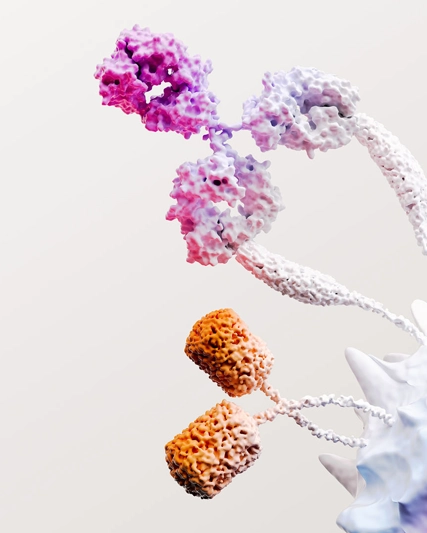Issued: London, UK
For media and investors only
US FDA grants regular approval for Jemperli for the treatment of patients with recurrent or advanced mismatch repair-deficient endometrial cancer
- Conversion from accelerated to regular (full) approval based on long-term outcomes from the GARNET phase I trial, which demonstrated an overall response rate of 45.4%
- 85.9% of patients had duration of response ≥12 months and 54.7% of patients had duration of response ≥24 months
GSK plc (LSE/NYSE: GSK) today reports that the US Food and Drug Administration (FDA) granted full approval for Jemperli (dostarlimab-gxly) for the treatment of adult patients with mismatch repair-deficient (dMMR) recurrent or advanced endometrial cancer, as determined by a US FDA-approved test, that has progressed on or following a prior platinum-containing regimen in any setting and are not candidates for curative surgery or radiation.
Hesham Abdullah, Senior Vice President, Global Head of Oncology Development, GSK, said: “This US regulatory action confirms our confidence in Jemperli as an important treatment option for patients with dMMR recurrent or advanced endometrial cancer. We continue to unlock the potential of Jemperli as the backbone for our immuno-oncology development programmes to address the unmet needs of patients, including earlier lines of endometrial cancer and other solid tumours.”
In April 2021, Jemperli received accelerated approval for the treatment of adult patients with dMMR recurrent or advanced endometrial cancer that had progressed on or following prior treatment with a platinum-containing regimen.
This approval is based on additional data collected from the A1 expansion cohort of the ongoing GARNET trial, a phase I, multicentre, open-label, single-arm study of Jemperli monotherapy in patients with advanced or recurrent solid tumours. Cohort A1 evaluated the efficacy of Jemperli in 141 patients with dMMR advanced or recurrent endometrial cancer that has progressed on or following prior treatment with a platinum-containing regimen. The major efficacy outcome measures were overall response rate (ORR) and duration of response (DOR) as assessed by a blinded independent central review according to RECIST v1.1. Confirmed ORR was 45.4% (95% CI: 37.0, 54.0), with a 15.6% complete response rate and a 29.8% partial response rate. Median DOR was not reached (range: 1.2+, 52.8+ months), measured from the time of first response, with 85.9% of patients having duration ≥12 months and 54.7% of patients having duration ≥24 months. Median follow-up for duration of response was 27.9 months.
Treatment-related adverse events were consistent with previous analyses for cohort A1. The most common adverse reactions (≥20%) were fatigue/asthenia, anaemia, rash, nausea, diarrhoea, constipation, and vomiting. The most common Grade 3 or 4 adverse reactions (≥2%) were anaemia, increased transaminases, urinary tract infection, fatigue/asthenia, and diarrhoea.
About endometrial cancer
Endometrial cancer is found in the inner lining of the uterus, known as the endometrium. Endometrial cancer is the most common gynaecologic cancer globally, with approximately 417,000 new cases reported each year worldwide1, and incidence rates are expected to rise by almost 40% by 2040.2,3 Approximately 15-20% of patients with endometrial cancer will be diagnosed with advanced disease at the time of diagnosis.4
About GARNET
The ongoing GARNET phase I trial is evaluating Jemperli as monotherapy in patients with advanced solid tumours. Part 2B of the study includes five expansion cohorts: dMMR/MSI-H endometrial cancer (cohort A1), mismatch repair proficient/microsatellite stable (MMRp/MSS) endometrial cancer (cohort A2), non-small cell lung cancer (cohort E), dMMR/MSI-H non-endometrial or POLE-mut solid tumour basket cohort (cohort F), and platinum-resistant ovarian cancer without BRCA mutations (cohort G). GARNET continues to enrol patients.
In cohort A1, patients received 500mg of Jemperli as an intravenous infusion once every three weeks (Q3W) for four doses, followed by 1,000mg once every six weeks until disease progression, discontinuation or withdrawal.
About Jemperli (dostarlimab)
Jemperli is a programmed death receptor-1 (PD-1)-blocking antibody that binds to the PD-1 receptor and blocks its interaction with the PD-1 ligands PD-L1 and PD-L2.5 GSK’s ambition is for Jemperli to become the backbone of the Company’s ongoing immuno-oncology-based research and development programme when used alone and in combination with standard of care and future novel cancer therapies, particularly for patients who currently have limited treatment options. Jemperli is being investigated in registrational enabling studies as monotherapy and as part of combination regimens, including in patients with recurrent or primary advanced endometrial cancer, patients with Stage III or IV non-mucinous epithelial ovarian cancer, and patients with other advanced solid tumours or metastatic cancers.
In the US, Jemperli is indicated for adult patients with mismatch repair-deficient (dMMR) recurrent or advanced endometrial cancer, as determined by a US FDA-approved test, that has progressed on or following a prior platinum-containing regimen in any setting and are not candidates for curative surgery or radiation. Jemperli is also indicated in the US for patients with dMMR recurrent or advanced solid tumours, as determined by a US FDA-approved test, that have progressed on or following prior treatment and who have no satisfactory alternative treatment options. The latter indication is approved in the US under accelerated approval based on tumour response rate and durability of response. Continued approval for this indication in solid tumours may be contingent upon verification and description of clinical benefit in a confirmatory trial(s).
Jemperli was discovered by AnaptysBio, Inc. and licensed to TESARO, Inc., under a collaboration and exclusive license agreement signed in March 2014. The collaboration has resulted in three monospecific antibody therapies that have progressed into the clinic. These are: Jemperli (GSK4057190), a PD-1 antagonist; cobolimab, (GSK4069889), a TIM-3 antagonist; and GSK4074386, a LAG-3 antagonist. GSK is responsible for the ongoing research, development, commercialisation, and manufacturing of each of these medicines under the agreement.
Please see accompanying US Prescribing Information (PDF - 621KB).
GSK in oncology
GSK is committed to maximising patient survival through transformational medicines. GSK’s pipeline is focused on immuno-oncology, tumour cell targeting therapies and synthetic lethality. Our goal is to achieve a sustainable flow of new treatments based on a diversified portfolio of investigational medicines utilising modalities such as small molecules, antibodies, and antibody-drug conjugates, either alone or in combination.
About GSK
GSK is a global biopharma company with a purpose to unite science, technology, and talent to get ahead of disease together. Find out more at gsk.com/company.
Cautionary statement regarding forward-looking statements
GSK cautions investors that any forward-looking statements or projections made by GSK, including those made in this announcement, are subject to risks and uncertainties that may cause actual results to differ materially from those projected. Such factors include, but are not limited to, those described in the Company's Annual Report on Form 20-F for 2021, GSK’s Q4 Results for 2022 and any impacts of the COVID-19 pandemic.
References
- [1] Sung H, Ferlay J, Siegel R et al. Global cancer statistics 2020: GLOBOCAN estimates of incidence and mortality worldwide for 36 cancers in 185 countries. CA Cancer J Clin. 2021. doi:10.3322/caac.21660.
- [2] Braun MM, et al. Am Fam Physician. 2016;93(6):468-474.
- [3] International Research on Cancer. Global Cancer Observatory. Cancer Tomorrow. https://gco.iarc.fr/tomorrow/en/dataviz/. Accessed 13 July 2022.
- [4] Kantar Health, Cust Study (2018).
- [5] Laken H, Kehry M, Mcneeley P, et al. Identification and characterization of TSR-042, a novel anti-human PD-1 therapeutic antibody. European Journal of Cancer. 2016;69,S102. doi:10.1016/s0959-8049(16)32902-1.


